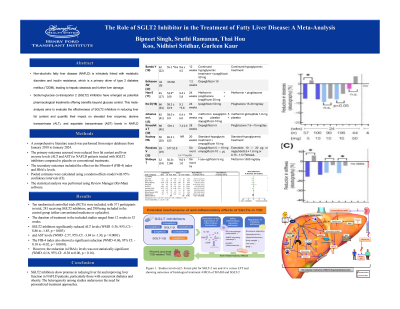Sunday Poster Session
Category: Liver
P1175 - The Role of SGLT2 Inhibitor in the Treatment of Non-Alcoholic Fatty Liver Disease: A Meta-Analysis
Sunday, October 27, 2024
3:30 PM - 7:00 PM ET
Location: Exhibit Hall E

- BS
Bipneet Singh, MD
Henry Ford Jackson Hospital
Jackson, MI
Presenting Author(s)
Bipneet Singh, MD1, Thai Hau Koo, MD2, Nidhishri Sridhar, MD3, Sruthi Ramanan, MD1
1Henry Ford Jackson Hospital, Jackson, MI; 2Hospital University of Science, Kubang Kerian, Kelantan, Malaysia; 3Heart and Vascular Institution, Bangalore, Karnataka, India
Introduction: Non-alcoholic fatty liver disease (NAFLD) is intricately linked with metabolic disorders and insulin resistance, which is a primary driver of type 2 diabetes mellitus (T2DM), leading to hepatic steatosis and further liver damage. Sodium-glucose co-transporter 2 (SGLT2) inhibitors have emerged as potential pharmacological treatments offering benefits beyond glucose control. This meta-analysis aims to evaluate the effectiveness of SGLT2 inhibitors in reducing liver fat content and quantify their impact on elevated liver enzymes, alanine transaminase (ALT), and aspartate transaminase (AST) levels in NAFLD patients.
Methods: A comprehensive literature search was performed from major databases from January 2018 to January 2024. The primary outcomes assessed were the reduction in liver fat content and liver enzyme levels (ALT and AST) in NAFLD patients treated with SGLT2 inhibitors compared to placebo or conventional treatments. The secondary outcomes included the effect on the Fibrosis-4 (FIB-4) index and HbA1c levels. Pooled estimates were calculated using a random-effects model with 95% confidence intervals (CI). The statistical analysis was performed using Review Manager (RevMan) software.
Results: Ten randomized controlled trials (RCTs) were included, with 571 participants in total, 281 receiving SGLT2 inhibitors, and 290 being included in the control group (either conventional medicine or a placebo). The duration of treatment in the included studies ranged from 12 weeks to 52 weeks. SGLT2 inhibitors significantly reduced ALT levels (WMD -5.36, 95% CI: -8.86 to -1.85, p = 0.003) and AST levels (WMD -2.57, 95% CI: -3.84 to -1.30, p < 0.0001). The FIB-4 index also showed a significant reduction (WMD -0.06, 95% CI: -0.10 to -0.02, p = 0.0010). However, the reduction in HbA1c levels was not statistically significant (WMD -0.16, 95% CI: -0.38 to 0.06, p = 0.16).
Discussion: SGLT2 inhibitors show promise in reducing liver fat and improving liver function in NAFLD patients, particularly those with concurrent diabetes and obesity. The heterogeneity among studies underscores the need for personalized treatment approaches. Further research is necessary to confirm long-term safety and efficacy.
Disclosures:
Bipneet Singh, MD1, Thai Hau Koo, MD2, Nidhishri Sridhar, MD3, Sruthi Ramanan, MD1. P1175 - The Role of SGLT2 Inhibitor in the Treatment of Non-Alcoholic Fatty Liver Disease: A Meta-Analysis, ACG 2024 Annual Scientific Meeting Abstracts. Philadelphia, PA: American College of Gastroenterology.
1Henry Ford Jackson Hospital, Jackson, MI; 2Hospital University of Science, Kubang Kerian, Kelantan, Malaysia; 3Heart and Vascular Institution, Bangalore, Karnataka, India
Introduction: Non-alcoholic fatty liver disease (NAFLD) is intricately linked with metabolic disorders and insulin resistance, which is a primary driver of type 2 diabetes mellitus (T2DM), leading to hepatic steatosis and further liver damage. Sodium-glucose co-transporter 2 (SGLT2) inhibitors have emerged as potential pharmacological treatments offering benefits beyond glucose control. This meta-analysis aims to evaluate the effectiveness of SGLT2 inhibitors in reducing liver fat content and quantify their impact on elevated liver enzymes, alanine transaminase (ALT), and aspartate transaminase (AST) levels in NAFLD patients.
Methods: A comprehensive literature search was performed from major databases from January 2018 to January 2024. The primary outcomes assessed were the reduction in liver fat content and liver enzyme levels (ALT and AST) in NAFLD patients treated with SGLT2 inhibitors compared to placebo or conventional treatments. The secondary outcomes included the effect on the Fibrosis-4 (FIB-4) index and HbA1c levels. Pooled estimates were calculated using a random-effects model with 95% confidence intervals (CI). The statistical analysis was performed using Review Manager (RevMan) software.
Results: Ten randomized controlled trials (RCTs) were included, with 571 participants in total, 281 receiving SGLT2 inhibitors, and 290 being included in the control group (either conventional medicine or a placebo). The duration of treatment in the included studies ranged from 12 weeks to 52 weeks. SGLT2 inhibitors significantly reduced ALT levels (WMD -5.36, 95% CI: -8.86 to -1.85, p = 0.003) and AST levels (WMD -2.57, 95% CI: -3.84 to -1.30, p < 0.0001). The FIB-4 index also showed a significant reduction (WMD -0.06, 95% CI: -0.10 to -0.02, p = 0.0010). However, the reduction in HbA1c levels was not statistically significant (WMD -0.16, 95% CI: -0.38 to 0.06, p = 0.16).
Discussion: SGLT2 inhibitors show promise in reducing liver fat and improving liver function in NAFLD patients, particularly those with concurrent diabetes and obesity. The heterogeneity among studies underscores the need for personalized treatment approaches. Further research is necessary to confirm long-term safety and efficacy.
Disclosures:
Bipneet Singh indicated no relevant financial relationships.
Thai Hau Koo indicated no relevant financial relationships.
Nidhishri Sridhar indicated no relevant financial relationships.
Sruthi Ramanan indicated no relevant financial relationships.
Bipneet Singh, MD1, Thai Hau Koo, MD2, Nidhishri Sridhar, MD3, Sruthi Ramanan, MD1. P1175 - The Role of SGLT2 Inhibitor in the Treatment of Non-Alcoholic Fatty Liver Disease: A Meta-Analysis, ACG 2024 Annual Scientific Meeting Abstracts. Philadelphia, PA: American College of Gastroenterology.
